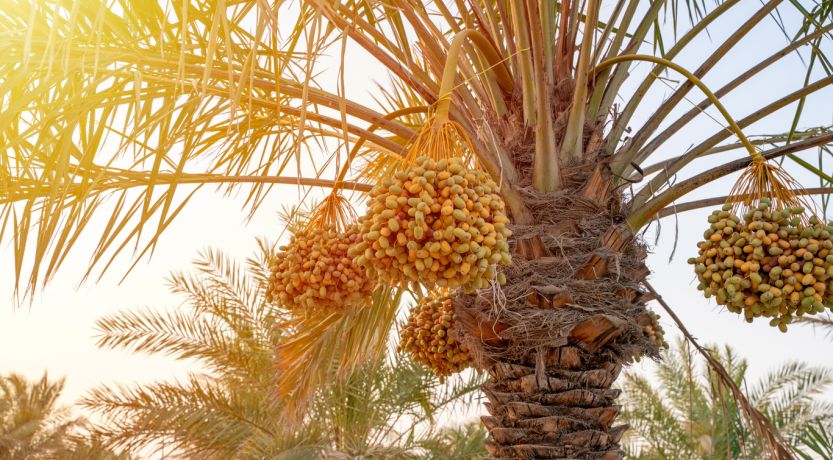What’s the Meaning of “the Righteous Shall Flourish Like a Palm Tree”?
The Bible likens righteous people to palm trees. What does that mean? What can palm trees teach us about how Christians are to live their lives?

Psalm 92:12-14 contains an interesting analogy:
“The righteous shall flourish like a palm tree, he shall grow like a cedar in Lebanon. Those who are planted in the house of the LORD shall flourish in the courts of our God. They shall still bear fruit in old age; they shall be fresh and flourishing.”
Have you ever considered a palm tree as a symbol of righteousness? Most people probably don’t look at palm trees and think, I need to be more like that!
So, are you flourishing like a palm tree?
The palm tree is a symbol of uprightness
We first read that the righteous “shall flourish.”
The word flourish is used three times in these verses. The Hebrew word here is parah, and according to Strong’s Definitions, it means “to break forth as a bud, i.e. bloom; generally, to spread; specifically, to fly (as extending the wings).”
Righteous people are portrayed as standing tall or shooting upward. The righteous are also compared to a cedar tree, which grows upright, tall and strong and can reach a height of 120 feet (37 meters) or more.
Both palm and cedar trees symbolize strength and uprightness.
By obeying the 10 Commandments, you can be upright like a palm or cedar tree.
In the book of Amos, God passes final judgment on the people of Israel for refusing to listen to the prophets He sent to warn them. He makes it clear that He will no longer overlook their sins. To demonstrate this, Amos sees the Lord standing on a wall with a plumb line in His hand. God tells Amos that the plumb line represents the standard He uses to measure Israel (Amos 7:7-8)
A plumb line is simply a weight that hangs on the end of a string. Gravity causes the plumb line to point straight downward and therefore provides a perfectly vertical line to assess how straight something is. Today, we use spirit levels, which rely on an air bubble within a vial or tube of colored liquid. When the bubble is centered within a specific range, it establishes a vertical line.
What God is essentially saying here is that He will bring punishment on those who aren’t spiritually upright. He will measure people’s character by the standard of the plumb line. All who are not upright—people who are spiritually crooked—will be punished for their sins.
The lesson is that people who are not structurally sound and aligned with God’s standards will, like a weak wall, eventually collapse.
What is God’s standard? The psalmist tells us, “For all Your commandments are righteousness” (Psalm 119:172). God’s commandments are the standards He uses to measure us.
By obeying the 10 Commandments, you can be upright like a palm or cedar tree.
The palm tree is a symbol of fruitfulness
The palm tree described in the psalm was likely a date palm, which was commonly grown in the Middle East. Date palms are slow-growing trees that do not bear fruit immediately. Patience is needed for them to grow tall and reach maturity.
Patience is also needed for the fruit. It takes five to eight years before the palm tree will bear fruit. The tree will produce approximately 22 pounds of fruit in its first crop, but then it will rapidly increase the fruit it bears, yielding upwards of 200 pounds of fruit when it’s 30 years old! While its productivity declines after 60 years, a date palm can still produce fruit when it’s 80 years old.
Like a palm tree, the righteous are pictured as bearing fruit. This is also reiterated in the New Testament, where Jesus referred to the righteous as the seed that fell on the good ground and bore fruit (Matthew 13:8, 23).
To produce spiritual fruit, we must work on our spiritual garden—turning the soil with prayer and Bible study so that we can continuously produce.
God expects Christians to produce fruit—spiritual character.
To produce spiritual fruit, we must work on our spiritual garden—turning the soil with prayer and Bible study so that we can continuously produce. God also helps us to bear fruit by spiritually pruning us—perfecting our character through trials so that we can grow even more fruit (John 15:2-8).
To continue maintaining our spiritual garden, we also need to be wary of the spiritual weeds that can choke the fruit of God’s righteousness. Weeds are symbolic of anything that inhibits growth. For example, Jesus warned that distractions can creep in and cause people to become unfruitful (Matthew 13:7, 22).
Other weeds can include excessive time spent on entertainment, work or social media.
Our world is brimful of distractions that can easily get in the way of maintaining a healthy spiritual life. The righteous should focus on becoming like a palm tree—bearing fruit even into their old age. They fight off the weeds of distraction and constantly feed on God’s Word.
As Jesus said, “Blessed are those who hunger and thirst for righteousness, for they shall be filled” (Matthew 5:6).
The palm tree is a symbol of stability that cannot be shaken
Jesus warned that those without strong roots are easily shaken by trials and fall away (Matthew 13:5-6, 20-21). Without strong roots, a Christian will be unable to endure the storms of life. The righteous, in contrast, are not easily shaken.
Palm trees consist of spongy, flexible tissue. They don’t have a tap root system like many other trees. Instead, they have thousands of roots, forming a dense system—resembling spaghetti in some ways—radiating in all directions.
These characteristics make them very resilient and unaffected by seasonal changes. They can survive droughts, floods and storms.
Palm trees are able to bend 40 to 50 degrees without snapping and can even withstand hurricane-force winds. At the end of a storm, they’ll return to their upright position with their root systems intact. Surprisingly, storms can stretch and even strengthen a palm tree’s roots. In many cases, palm trees are stronger in the aftermath of a powerful windstorm.
Whatever happens around him or her, the strong Christian remains consistent and continues to grow and bear spiritual fruit.
How can Christians be like this?
They must put their trust in the God who doesn’t change (Malachi 3:6; Hebrews 13:8). Their hope in God and His Kingdom becomes the “anchor of the soul, both sure and steadfast” (Hebrews 6:19).
A righteous Christian will flourish like a palm tree, strive to be upright by keeping God’s commandments, bear fruit while developing a closer relationship with God, and will not be easily shaken by the storms of life.
Date Posted: April 1, 2022



